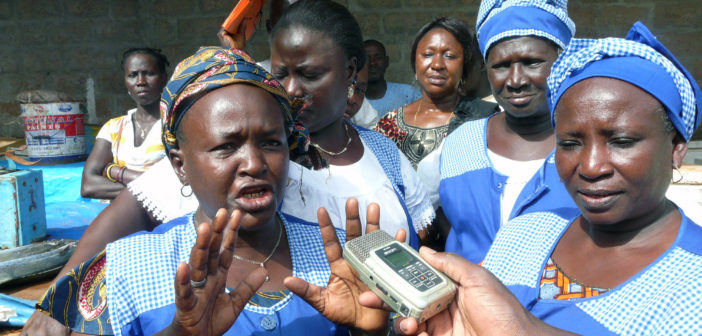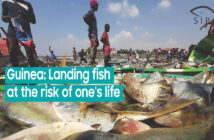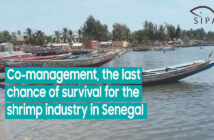At the fish market of Bissau’s artisanal fishing port, fishermen and women fishmongers can’t hide their joy to be able to carry on with their activity in all tranquility. “I am very happy with your visit and I count on you to convey our greetings to the world”, says Ignasia Da Silva, President of Bissau Fishmongers Association. Her Vice President, Lydia Da Costa, proudly adds: “This is the largest fish market in Guinea-Bissau. There are about 500 women working here”.
Thirty meters away, there is a shed. This is where women proceed with retail sales. The place is strikingly clean. But, alas, there is not enough room for all the women. Others have found a place outside where, braving the ban from the administration, they spread their products on the ground. No choice: They have to sell for their family’s sake.
Most of the women arrive at the market between four and five every morning. When the first fisherman comes back, the competition amongst the women starts, every day tougher, to have access to decreasing quantities of fish: “Some years ago, a fisherman would take the ice, go to sea, and after forty-five minutes, he would be back with a lot of fish. Nowadays, they go to sea for the whole day and they do not bring much fish back”, reflects Lydia Da Costa.
 Isabelle Igana is the oldest of the fishmongers: “I was here before anyone else. All these women here, I saw them engage in fish trade. Now I am 76 years old”, she proudly announces. “When I started, I was 25 years old. This market for selling fish did not exist. Initially, the fishermen went to sea and returned at regular hours. We could predict the time of their return, so we knew also at what time we should come here, take the fish, sell it straight away and then immediately return to our homes”, she explains.
Isabelle Igana is the oldest of the fishmongers: “I was here before anyone else. All these women here, I saw them engage in fish trade. Now I am 76 years old”, she proudly announces. “When I started, I was 25 years old. This market for selling fish did not exist. Initially, the fishermen went to sea and returned at regular hours. We could predict the time of their return, so we knew also at what time we should come here, take the fish, sell it straight away and then immediately return to our homes”, she explains.
In her memories, that was the belle époque, when fish resources were plentiful and women could both engage in fish trade and be present at home for their families, for their children. “Then the war came. People lost their purchasing power. Fishermen abandoned the fishing. We started to encounter difficulties to get the fish and even the little that we got, we couldn’t sell it”, continues Isabelle Igana. “Finally, peace returned to the country. But there is no more fish”, she says under the approving eyes of dozens of women surrounding us.
Inoussa Maïga.




